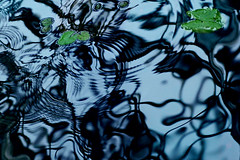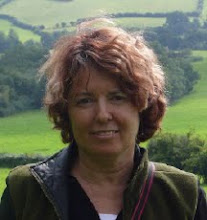film fe(a)sting
The Toronto International Film Festival 2006 is officially over.
This was my first year partaking of it, and I only barely scratched the surface.
I love film, and I've discovered this city is enamoured of it, too. I don't mean the movie star glamour and sightings, which are numerous, but film and cinema itself. Just while standing in lines, I overheard people, ordinary people, plotting out their viewing strategies. I was surprised by how many attacked the festival with a vengeance.
Today, an older man in front of me in a line bemoaned the fact to his friends that he was only seeing one to two films a day, half of his usual fare. Last week a woman spoke to others, who equalled her enthusiasm, about her preference for foreign films over the big-name blockbusters, which she would see later, anyway.
I only saw three films this year, over the last two weeks. And I saw them with my free vouchers from volunteering for TIFFG since January. This festival works on so many levels. Big things that work always fascinate me. Because to make something big work well, with ease, is incredibly difficult. Their volunteer base runs like a marathoner on an adrenalin high.
Too many options, too many films, too many ways to be a part of the festival. But good stuff. Last week I saw Paris: Je t'aime on rush seating, and tried to read sub-titles from a neck-breaking angle in the third row. A film about love and Paris, it was constructed of 18 vignettes created by different directors. It worked for me, especially the closing segment directed by Sideways' Alexander Payne (mighty cute, too when he appeared in the Q&A). My second film last week was a German film Summer 04, which was well done, but about which I'm neutral.
Today I saw Spike Lee's When the Levees Broke: A Requiem in Four Acts, which was also four hours long, and concerns Hurricane Katrina and the flooding of New Orleans. Memorable and important and agonizing and touching. One memorable quote, from one of the many people who speak on screen, was that President Bush 'gave all 'C' students the world over a bad name.'
The jazz musician Wynton Marsalis says in the film that Katrina was like an unflattering image in a mirror, an exact and true reflection of a reality in America, that previously was unseen or denied. Katrina stripped the facade away until the truth was in plain view.
It is a devastating story. I remember the media uproar about how whites 'borrow' to survive, and blacks 'loot', but I wasn't aware of how Rev. Sharpton objected to the American press and specifically requested that they desist from referring to Katrina victims as 'refugees'.
Very thought-provoking. I'm not sure wealthy people from West Palm Beach would be considered 'refugees' in the same situation.
The spring before Katrina, I happened to be in the area north of West Palm Beach that had been hit hard by a hurricane the season before. Along the ocean sand spit populated by mansions and luxury hotels, you could see the government's (which government's?) money put to use dredging up sand from the ocean's bottom to rebuild the beaches. After seeing the care taken to rebuild that strip of Florida beach, it was personally sobering to watch the lack of aid to New Orleans months later, and then again, as it turns out, a year later.
I didn't have the opportunity to see Sarah Polley's film Away From Her, based on a short story by the inimitable Alice Munro, but when I realized I had the story The Bear Came Over the Mountain, unread, I opened the book and read it.
Looking forward to enjoying this feast for years to come.
This was my first year partaking of it, and I only barely scratched the surface.
I love film, and I've discovered this city is enamoured of it, too. I don't mean the movie star glamour and sightings, which are numerous, but film and cinema itself. Just while standing in lines, I overheard people, ordinary people, plotting out their viewing strategies. I was surprised by how many attacked the festival with a vengeance.
Today, an older man in front of me in a line bemoaned the fact to his friends that he was only seeing one to two films a day, half of his usual fare. Last week a woman spoke to others, who equalled her enthusiasm, about her preference for foreign films over the big-name blockbusters, which she would see later, anyway.
I only saw three films this year, over the last two weeks. And I saw them with my free vouchers from volunteering for TIFFG since January. This festival works on so many levels. Big things that work always fascinate me. Because to make something big work well, with ease, is incredibly difficult. Their volunteer base runs like a marathoner on an adrenalin high.
Too many options, too many films, too many ways to be a part of the festival. But good stuff. Last week I saw Paris: Je t'aime on rush seating, and tried to read sub-titles from a neck-breaking angle in the third row. A film about love and Paris, it was constructed of 18 vignettes created by different directors. It worked for me, especially the closing segment directed by Sideways' Alexander Payne (mighty cute, too when he appeared in the Q&A). My second film last week was a German film Summer 04, which was well done, but about which I'm neutral.
Today I saw Spike Lee's When the Levees Broke: A Requiem in Four Acts, which was also four hours long, and concerns Hurricane Katrina and the flooding of New Orleans. Memorable and important and agonizing and touching. One memorable quote, from one of the many people who speak on screen, was that President Bush 'gave all 'C' students the world over a bad name.'
The jazz musician Wynton Marsalis says in the film that Katrina was like an unflattering image in a mirror, an exact and true reflection of a reality in America, that previously was unseen or denied. Katrina stripped the facade away until the truth was in plain view.
It is a devastating story. I remember the media uproar about how whites 'borrow' to survive, and blacks 'loot', but I wasn't aware of how Rev. Sharpton objected to the American press and specifically requested that they desist from referring to Katrina victims as 'refugees'.
Very thought-provoking. I'm not sure wealthy people from West Palm Beach would be considered 'refugees' in the same situation.
The spring before Katrina, I happened to be in the area north of West Palm Beach that had been hit hard by a hurricane the season before. Along the ocean sand spit populated by mansions and luxury hotels, you could see the government's (which government's?) money put to use dredging up sand from the ocean's bottom to rebuild the beaches. After seeing the care taken to rebuild that strip of Florida beach, it was personally sobering to watch the lack of aid to New Orleans months later, and then again, as it turns out, a year later.
I didn't have the opportunity to see Sarah Polley's film Away From Her, based on a short story by the inimitable Alice Munro, but when I realized I had the story The Bear Came Over the Mountain, unread, I opened the book and read it.
Looking forward to enjoying this feast for years to come.




